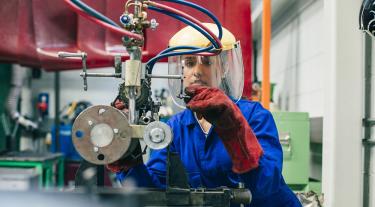These projects are the fourth phase of the Industrial Energy Efficiency Accelerator (IEEA) programme, supported by the Department for Energy Security and Net Zero, which helps innovators to demonstrate technology for industrial use. Phase 4 winners also include two different pioneering metal working techniques, new ventilation systems, methods for cleaning food manufacturing equipment and concrete technology.
Minister for Energy Efficiency and Green Finance, Lord Callanan said, "We’re world-leading when it comes to reducing carbon-emissions but there is more to do. Today we’re awarding £4.8 million to seven cutting-edge energy efficiency projects - from fast-fashion recycling to robotic food processing - that will help take us a vital step closer towards industrial decarbonisation. This marks the final phase in this £10m round of our Industrial Energy Efficiency Accelerator programme, as we continue to invest in solutions that will drive clean, green growth for generations to come.”
The IEEA is managed by the Carbon Trust, in partnership with Jacobs and Innovate UK KTN. Funding for the accelerator comes from the Department for Energy Security and Net Zero as part of the £1bn Net Zero Innovation Portfolio (NZIP).
Paul McKinney, Associate Director and manager of the IEEA for the Carbon Trust said, “there is real demand, now more than ever, for the type of technology being scaled up by the IEEA. The industrial sector, as with all parts of our economy, is thinking about how it can decarbonise, reduce waste and improve general sustainability. We are pleased to be providing the support for these technologies through the seven successful projects announced today. They join strong alumni from phases 1, 2 and 3 of the IEEA, many of which are being scaled up significantly, following their support through the accelerator.”
During Phase 1 and Phase 2 the IEEA supported the demonstration of 16 new energy efficiency process technologies at industrial scale.
Combined, these projects have the potential to save an estimated 40.5TWh of energy by 2031, enough cumulative savings to provide electricity for 11 million1 UK homes for a year based on analysis from the Carbon Trust.
As of June 2022, half of the 16 supported companies from Phases 1 and 2 have gone on to secure follow-on funding. Together they have raised more than £20 million in the form of equity, angel investment, loans, and other UK government funding.
Current estimates predict that the Phase 3 and 4 projects could save around 11,912 tCO2e per year. These carbon savings do not include cumulative emissions saved from an industry-wide roll out.
Phase 4 projects are:
- Ai Build and partners Weir Minerals and the Manufacturing Technology Centre are replacing wooden casting patterns used in metal foundries with recyclable 3D-printed versions, aiming to reduce energy and material use, and allow more efficient castings to be designed and produced.
- A UK based egg processor are working with Avgo Group of Companies to trial a new RecEgg process which recycles waste eggshells into calcium carbonate for use in the pharmaceutical industry. It also captures other waste and emissions, reducing the landfill from waste eggshells, as well as the need for mining of calcium carbonate.
- FP McCann are working with B9 Solutions, the National Composites Centre and Queen’s University Belfast, to test a new fibre technology for reinforcing precast concrete, with the aim to save on energy use in manufacturing as well as improving productivity.
- Solina, a food manufacturer and supplier to Marks and Spencer plc, are planning to install Olympus Automation’s (or OAL’s) new robotic food processing system. This cutting-edge technology is designed to significantly reduce the energy consumption associated with product manufacturing and in-situ equipment cleaning processes, resulting in increased efficiency and a more sustainable production environment.
- Plan B and the Salvation Army Trading Company are fighting textile waste by recycling polyester clothing and other textiles in a new technology trial. The technology will turn textile waste into a reusable pellet which can then be turned back into clothing or plastic products, displacing virgin polyester use.
- R&B Industrial are developing and retrofitting a fully wireless local exhaust ventilation control system (LEV) at Inktech Rochdale. The LEV helps protect workers from dust and solvent fumes and the new technology will achieve energy savings of up to 70%, using sensor technology and innovative energy harvesting.
- A new forging technique, pioneered by Dr Jokin Lozares Abasolo (University of Deusto) through collaboration with the University of Warwick, is expected to cut waste in the metal forging industry by utilising Near-Solidus Forging temperatures to reduce the number of hammer strikes needed to produce a near net shape, saving energy and significantly reducing the amount of raw material required. W.H. Tildesley will be the first to trial the technology in an industry setting, bringing in expertise from University of Deusto and Hydrasun.
The IEEA contributes between £150,000 and £1 million to each project, typically around 40-60% of project funding, with the remainder being funded by the successful applicant(s).
It was launched in 2017 and has awarded £11.7m in grant funding throughout Phases 1, 2 and 3, with a further £4.8m awarded in Phase 4. Combined, the IEEA has leveraged £14m from the private sector to support the 31 projects.
ENDS
Notes to editors
For further information please contact The Carbon Trust press office on +44 (0)20 7170 7050 or press@carbontrust.com.
About the Carbon Trust
The Carbon Trust is a global climate organisation driven by the mission to accelerate the move to a decarbonised future. We have been pioneering decarbonisation for more than 20 years for businesses, governments, and organisations. Drawing on a network of over 400 experts internationally, the Carbon Trust guides organisations through their journey to Net Zero. From strategic planning and target setting to delivery, activation, and communication - we provide smarter ways to turn intent into impact.


